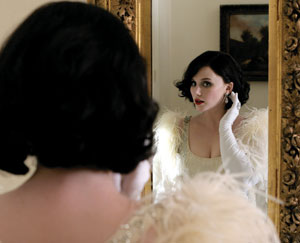THE 1920s-era anti-heroine of The Loss of a Teardrop Diamond is named Fisher Willow; this is the most alluvial name since James Joyce’s Anna Livia Plurabelle. No surprise that Fisher (Bryce Dallas Howard) is drawn to the Mississippi River to sit and take good long stares at its majesty. Like the river, she tends to go crazy and jump the banks. Furthermore, her family name has been skunked by a river-related incident. Her father’s attempts to save his own crop by dynamiting a levee south of his land killed some farmers. (The incident is staged, badly, right at the beginning of the film.)
To cope, Miss Fisher parties hearty, dancing by herself at juke joints and coming home in a roadster at dawn. She has spent time away from the Delta in Europe, where she gathers famous names to drop. The heiress to two fortunes, she could have any man who could stand the scandal. Fisher’s real interest, however, is the dirt-poor scion of a once famous line: Jimmy (Chris Evans, useless in the part), whose grandfather was a governor, whose mom is in the madhouse and whose father (Will Patton) is the kind of stage drunk who always carries around a half-empty bottle of whiskey. Fisher feels that Jimmy will clean up good if she slaps a tux on him. However, Jimmy may be poor but he has principles, and Fisher’s unorthodox behavior may be too much for him.
Actress-turned-director Jodie Markell is a Southerner. Adapting this never-filmed screenplay by Tennessee Williams (intended for Elia Kazan, but events intervened), she delivers a great deal of surface on a low budget. The Louisiana locations, captured by Giles Nuttgens (The Deep End, Bee Season), are just what you would expect from this top-drawer cinematographer. He gives us riverbank reveries and moonlit cloudscapes and a haunting subjective view of an opiated Halloween party. He also deserves credit for getting Howard to look so unusually interesting. The tousled brown wig and the air of unnerved sleeplessness make her stand out in ways that she hasn’t in previous films. But 50 years in cold storage was no loss for the script. The arias and crescendos you look for in Williams aren’t here, except, that is, for some shivery passages with Ellen Burstyn. She plays a stroke-paralyzed invalid with balled fists, wasting away in her bedroom: “A chamber of horrors,” as Burstyn’s Miss Addie calls it. Markell takes a crazy risk that works; she puts an actual theatrical spotlight on the actors in the scene Howard and Burstyn share. We stop to take in a monologue about how Addie had lived in “the tolerant Orient,” far away from the cotton fields. Addie reaches out to Fisher for a mercy killing: “I could resume my travels …”
This sequence shows Fisher’s unconcern for societal strictures, even the stricture against killing. What it really shows is that this retrieved script had some stirring moments in the midst of a crisis we can’t feel for: first, the problems of a brittle, snubbed and very wealthy woman who hates the South but can’t live anywhere else; second, the problems of a woebegone kid, too high-minded to be a gigolo even to a woman who looks like a million dollars.
Local theaters, show times and tickets at MovieTimes.com.
THE LOSS OF A TEARDROP DIAMOND (PG-13; 102 min.), directed by Jodie Markell, written by Tennessee Williams, photographed by Giles Nuttgens and starring Bryce Dallas Howard, Chris Evans and Ellen Burstyn, opens Jan. 8 at Camera 12 in San Jose.



